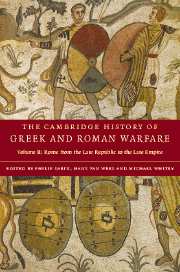Book contents
- Frontmatter
- Part I The Late Republic and the Principate
- Part II The later Roman Empire
- 7 International relations
- 8 Military forces
- 9 War
- 10 Battle
- 11 Warfare and the state
- 12 War and Society
- Chronological table
- Glossary
- List of ancient authors
- Bibliography
- Index of ancient passages cited
- General index
- Map 6. The provinces under Trajan."
- References
9 - War
from Part II - The later Roman Empire
Published online by Cambridge University Press: 28 March 2008
- Frontmatter
- Part I The Late Republic and the Principate
- Part II The later Roman Empire
- 7 International relations
- 8 Military forces
- 9 War
- 10 Battle
- 11 Warfare and the state
- 12 War and Society
- Chronological table
- Glossary
- List of ancient authors
- Bibliography
- Index of ancient passages cited
- General index
- Map 6. The provinces under Trajan."
- References
Summary
The third century A.D. saw a fundamental shift in the circumstances of Roman war. For several centuries, indeed since the defeat of Hannibal, Romans had usually enjoyed the luxury of deciding when and where to go to war against foreign enemies: civil wars were clearly an exception, but opponents such as Mithridates who challenged the Romans to a confrontation were rare. As a result, the Romans could, to an extent, arrange their campaign commitments to suit themselves. In late antiquity almost the opposite situation prevailed: the majority of wars were undertaken in response to external threats, serious ones in contrast to the excuses which were sometimes exploited during the Republic to justify expansionist campaigns. This meant that the Romans no longer controlled so securely the place, timing or even nature of the wars which they had to fight; more campaigning occurred within the Empire’s borders, and emperors were more often embarrassed by the need to deal with multiple threats; enemies might even have specific knowledge about Roman commitments elsewhere, and exploit this in their dealings (e.g. the Persians in 582: Men. Prot. fr. 26.1.40–58). Occasions when an emperor felt able to take the initiative were very rare: Julian’s decision to invade Persia in 363 is one example, although that was in the context of a war which had already been running for twenty-five years; Justinian’s plans for reconquest are a clearer case, since he deliberately set out to create stability on the eastern frontier in order to permit a strategic redeployment to the west, a policy which worked in the short term even if it was upset by Khusro’s invasion in 540.
Keywords
- Type
- Chapter
- Information
- The Cambridge History of Greek and Roman Warfare , pp. 310 - 341Publisher: Cambridge University PressPrint publication year: 2007
References
- 2
- Cited by

